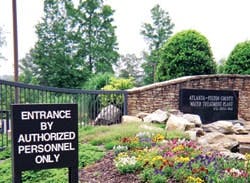Nearly every company would consider a safe and secure workplace to be a top priority. This is especially the case when you are responsible for protecting and distributing the water supply for millions of people. The fear of terrorist attacks, coupled with strict Homeland Security regulations, have forced many water facilities to look for a cost-effective and versatile system to control access and eliminate key control problems.
Growing concerns
After 9/11, the Atlanta-Fulton County Water Treatment Facility became more concerned with knowing who had access to vital parts of their infrastructure. With any mechanical key system, it is difficult to know who has keys to which locks.
A traditional key system also means that those individuals who are authorized to have keys have unlimited access throughout the day, with no evidence to show who opens which locks.
Located in Alpharetta, Ga., the Atlanta-Fulton County facility is one of the largest in the state. The facility is operated by Joint Venture of Veolia Water North America & Khafra Engineering Consultants, Inc. (VWNA/KEC).
VWNA manages more than 550 water and wastewater treatment facilities throughout the U.S.
The Atlanta-Fulton County water treatment facility had a need to implement a system that could control access to a variety of openings. These included main entrances and office doors, as well as storage areas, padlocks, gates, chemical feed areas and computer cabinets that house the control systems for the plant.
With the large number of cylinders offered, VWNA/KEC was able to replace the mechanical cores in all of these locations with CyberLock electronic cylinders.
VWNA/KEC selected CyberLock for its versatility, increased security features and ease of installation. CyberLock cylinders are designed to replace traditional mechanical lock cylinders and install easily without the need for expensive hard-wiring.
In addition, the unique design of a CyberKey does not allow it to be duplicated. Passwords specific to each system allow the locks and keys to know they are part of the same database, and to exchange information.
Terry Jones, assistant project manager for VWNA/KEC, said "CyberLock has done everything that I was told it could do, and more."
Detailed record
CyberLocks limit user access to specified locks at pre-determined days and at specific times. A record of each opening and attempted access is stored in both the lock and the key. Up to 3,900 of the most recent events are stored in the key, and the last 1,100 events are stored in the lock.
"For extra security, e-mail notifications can be set up to alert administrators of high-risk events, such as when a key is denied entry or when a specific lock is opened," he continued. "Keys can be set with an expiration date, which can minimize the security risk when distributing keys to temporary contractors. "With the addition of CyberLock , security at the Atlanta-Fulton County Water Treatment Plant has vastly improved. The tasks of maintaining a mechanical key system, including re-keying and re-coring, are relegated to the past. When a key is misplaced or falls into the wrong hands, the locks can be programmed to recognize the key and to deny access to the user.
"We have been able to implement and maintain an increased security plan when alert levels issued by the government change rapidly," Jones concluded.
